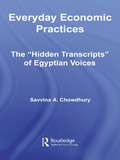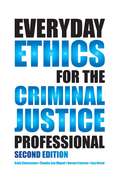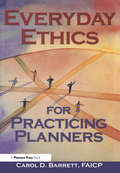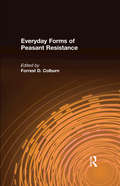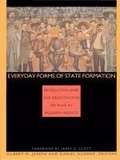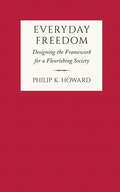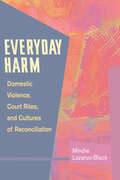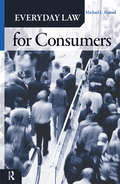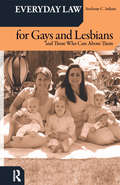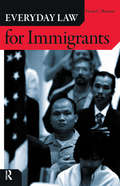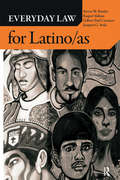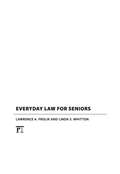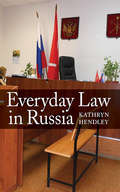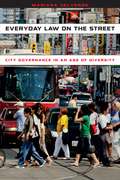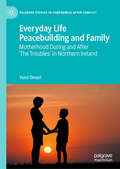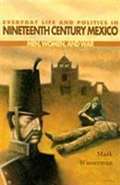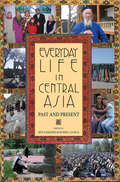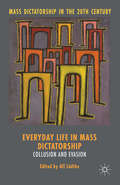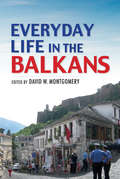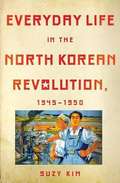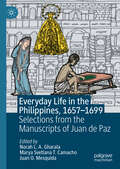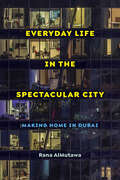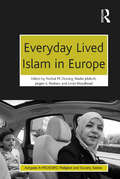- Table View
- List View
Everyday Economic Practices: The 'Hidden Transcripts' of Egyptian Voices
by Savinna ChowdhuryThis book brings to the forefront the significance of local everyday economic practices to development policymaking. Chowdhury's objective in unearthing these diverse activities is two-fold. She demonstrates why it is a misrepresentation to characterize all that is economic as "capitalism". Additionally, she contends that in those i
Everyday Ethics For The Criminal Justice Professional
by Durant Frantzen Kelly Cheeseman Lisa Nored Claudia MiguelEveryday Ethics for the Criminal Justice Professional focuses on getting students to think about ethics in the day-to-day context. By placing an emphasis on practical applications as opposed to theoretical ideologies the book is more user friendly to the student of the 21st century. Unlike other texts, it includes forensics and private security in the list of criminal justice professions, their impact on the field and what it means to ''do business'' in criminal justice. The text also utilizes practical scenarios in in the career fields of policing, institutional corrections, community corrections, prosecutors and judges, private security, criminal justice supervision and forensics to allow for students to apply theoretical concepts to real life criminal justice situations. The text prepares students to think and process through ethics in both the concrete and abstract.
Everyday Ethics for Practicing Planners
by Carol Barrett"This book is on the suggested reading list for planners preparing to take the AICP exam. As veteran planner the author points out, the most troublesome conflicts for planners aren't between good and bad, they're between competing good, neither of which can be fully achieved. The 54 real-world scenarios described here typify the tough moral dilemmas that confront today's practioners. The author offers planners a way to recognize the ethical conflicts that arise in everyday practice, analyze them using ""practical moral reasoning,"" apply relevant sections of the AICP Code of Ethics and the APA/AICP Ethical Principles in Planning (both of which are included in full), and decide on the best course of action. The author tells a series of stories-each one a sticky situation that could confront a typical planner. Barrett points out the ethical issues, identifies possible alternatives, and cities relevant sections of the AICP Code. Finally, the author discusses the pros and cons of each alternative. Five particularly complex scenarios are especially intended for group discussion. Individuals studying for the AICP exam will find this book indispensable. But it also should be required reading for every planner who struggles to act ethically and for planning student who wants to understand how professionals define and serve the public interest. Planning agencies, private consulting firms, and planning commissions can use its realistic scenarios to jump start group discussions and workshops on ethical planning."
Everyday Forms of Peasant Resistance
by Forrest D. ColburnPeasant rebellions are uncommon. "Everyday Forms of Peasant Resistance" explores peasants' foot dragging, feigned ingorance, false compliance, manipulation, flight, slander, theft, arson, sabotage, and similar prosaic forms of struggle. These kinds of resistance stop well short of collective defiance, a strategy usually suicidal for the subordinate. The central argument about peasant resistance is presented in the opening chapter by James Scott in which he summarizes and extends the thesis of his book on Malaysia's peasantry, "Weapons of the Weak". Scott's ideas are employed and refined in the ensuing seven country studies of peasant resistance: Poland, India, Egypt, Colombia, China, Nicaragua and Zimbabwe.
Everyday Forms of State Formation: Revolution and the Negotiation of Rule in Modern Mexico
by Gilbert M. Joseph Daniel NugentEveryday Forms of State Formation is the first book to systematically examine the relationship between popular cultures and state formation in revolutionary and post-revolutionary Mexico. While most accounts have emphasized either the role of peasants and peasant rebellions or that of state formation in Mexico's past, these original essays reveal the state's day-to-day engagement with grassroots society by examining popular cultures and forms of the state simultaneously and in relation to one another.Structured in the form of a dialogue between a distinguished array of Mexicanists and comparative social theorists, this volume boldly reassesses past analyses of the Mexican revolution and suggests new directions for future study. Showcasing a wealth of original archival and ethnographic research, this collection provides a new and deeper understanding of Mexico's revolutionary experience. It also speaks more broadly to a problem of extraordinary contemporary relevance: the manner in which local societies and self-proclaimed "revolutionary" states are articulated historically. The result is a unique collection bridging social history, anthropology, historical sociology, and cultural studies in its formulation of new approaches for rethinking the multifaceted relationship between power, culture, and resistance.Contributors. Ana María Alonso, Armando Bartra, Marjorie Becker, Barry Carr, Philip Corrigan, Romana Falcón, Gilbert M. Joseph, Alan Knight, Florencia E. Mallon, Daniel Nugent, Elsie Rockwell, William Roseberry, Jan Rus, Derek Sayer, James C. Scott
Everyday Freedom: Designing the Framework for a Flourishing Society
by Philip K. Howard“America is in a self-reinforcing spiral of decreasing trust, confidence, and capability. [Howard] shows us how to break out of it . . . short, clear, passionate.” —Jonathan Haidt, New York Times-bestselling author of The Righteous MindSomething basic is missing in our culture. Americans know it. Nothing much works as it should. Simple daily choices seem impossible, or fraught with peril. In the workplace, we walk on eggshells. Big projects—say, modernizing infrastructure—get stalled in years of review. Endemic social problems such as homelessness become, well, more endemic. Yet there’s a glaring vacuum in the 2024 political debate—no party or candidate offers a governing vision that deals with the root causes of alienation and failure.Everyday Freedom pinpoints the source of powerlessness that is fraying American culture and causing public failure, and offers a bold vision of simpler governing frameworks to re-empower Americans in their daily choices. It diagnoses our collective futility as resulting from the assault on authority after the 1960s that, aimed at enhancing freedom, instead created a plague of powerlessness. The teacher in the classroom, the principal in a school, the nurse in the hospital, the official in Washington, the parent on a field trip, the head of a local charity or church . . . all have their hands tied. Who has a vision to revive hope and action? Not political leaders, who are picking the scab of resentment while social media gets rich selling distrust. (Stop the Steal! Defund the Police!) Everyday Freedom, in the tradition of Thomas Paine’s ”Common Sense,” offers a radical vision for change: Re-empower Americans in their everyday choices. Nothing will work sensibly until Americans are free to draw on their skills, intuitions, and values when confronting daily challenges. This is the only cure to alienation—and the only way to deliver good government. Embraced by some of America’s leading economists, jurists, social psychologists, and philosophers, Philip Howard’s understanding of the essential role of human agency is the key to making America a fully functioning democracy again—a place where problems can be solved and positive progress can be made.
Everyday Harm: Domestic Violence, Court Rites, and Cultures of Reconciliation
by Mindie Lazarus-BlackExposing the powerful contradictions between empowering rights and legal rites By investigating the harms routinely experienced by the victims and survivors of domestic violence, both inside and outside of law, Everyday Harm studies the limits of what domestic violence law can--and cannot--accomplish. Combining detailed ethnographic research and theoretical analysis, Mindie Lazarus-Black illustrates the ways persistent cultural norms and ingrained bureaucratic procedures work to unravel laws designed to protect the safety of society’s most vulnerable people. Lazarus-Black’s fieldwork in Trinidad traces a story with global implications about why and when people gain the right to ask the court for protection from violence, and what happens when they pursue those rights in court. Why is itthat, in spite of laws designed to empower subordinated people, so little results from that legislation? What happens in and around courts that makes it so difficult for people to obtain their legally available rights and protections? In the case of domestic violence law, what can such legislation mean for women’s empowerment, gender equity, and protection? How do cultural norms and practices intercept the law?
Everyday Law for Consumers
by Michael L. Rustad"Your toolkit for prevention, redemption, and occasionally retribution." -Ralph Nader Whenever you purchase goods or services in a personal, household, or family capacity, you are entitled to the rights and remedies of state and federal consumer law. Realistically, only a very small percentage of consumer problems can be addressed by hiring a private attorney. Everyday Law for Consumers teaches practical self-help remedies that ordinary Americans can use to protect their consumer rights. Michael L. Rustad, a nationally known practicing attorney and legal scholar, translates into plain English the legalese that forms the basis for many common transactions, including consumer loans, credit repair, credit, consumer leases, usury, interest rates, Internet transactions, identity theft, distance contracts, home shopping, television advertisements, door-to-door sales, and telephone solicitations. Using real-life examples, sample complaint letters, and an appendix of further examples, this easy-to-read book empowers everyday people to become effective self-advocates in an increasingly consumer-driven society.
Everyday Law for Gays and Lesbians: And Those Who Care About Them
by Anthony C. Infanti"Mandatory reading for anyone who cares about lesbians and gay men." Patricia A. Cain, Inez Mabie Professor of Law, Santa Clara University Everyday Law for Gays and Lesbians and Those Who Care about Them accessibly explains the myriad ways the law applies to and affects lesbian and gay lives. Written both concretely and clearly, each chapter opens with a vivid story about actual experiences of lesbians and gay men and then uses those experiences as a springboard for discussing the law. Using his personal and expert professional experience, Anthony Infanti makes complicated legal issues approachable, including marriage and its alternatives, bias crimes, the military, education, employment, housing, medical and tax planning, and parenting. Going beyond a mere summary of the law, this book provides both legal and nonlegal strategies for coping with and effecting positive change in the law as it affects the lives of lesbians and gay men. The book also contains an appendix with a list of useful resources for lesbians, gay men, and those who care about them.
Everyday Law for Immigrants
by Victor C. RomeroImmigration is one of the most controversial topics of the decade. Citizens and pundits from across the political spectrum argue for major and disparate changes to American immigration law. Yet few know what American immigration law actually is and how it functions. Everyday Law for Immigrants is an ideal guide for U.S. citizens who want a better understanding of our immigration laws as well as for migrants who make the United States their home. Romero deftly and comprehensively explains the basic challenges immigrants and foreign nationals face not only within formal immigration policy but also within American domestic law generally, including rules promulgated by federal, state, and local entities that affect noncitizens. A concise and accessible primer for interested citizens, noncitizens, and their advocates, this book provides a bird's-eye view of U.S. immigration history, practice, and procedure, and constructively addresses the many legal issues in areas such as education, housing, and employment that affect foreigners who reside here. It includes easy-to-understand examples and an extensive appendix of print and Internet resources for further help.
Everyday Law for Latino/as
by Raquel Aldana Steven W. Bender Joaquin G. Avila Gilbert Paul CarrascoNow the most populous minority group in the United States, Latino/as increasingly need guidance on the everyday issues that affect their economic livelihood, their freedom, and their equal rights to dignity and opportunity. This comprehensive guide is organized around the three flashpoints that contribute to the unique legal treatment of Latino/as-immigration status, language regulation, and racial/ethnic discrimination. These points are examined in the venues of everyday life for Latino/as-from discrimination in housing to discrimination and language regulation in the workplace and lack of protection for immigrant labor, to classrooms where the bilingual education debate rages, to the voting booth and the criminal justice system where Latino/as confront racial profiling and language barriers.
Everyday Law for Seniors: Updated With The Latest Federal Benefits (Everyday Law Ser.)
by Lawrence A. Frolik Linda S. WhittonAn essential resource, Everyday Law for Seniors provides easy-to-understand information for readers who want to make the best possible decisions about retirement options, health care, where to live, and planning for long-term care. Frolik and Whitton, national experts in elder law, explain the wide range of legal rights and benefits that every senior should consider, whether looking ahead or responding to a crisis. Updated with the latest federal benefit information and a host of helpful internet resources, this timely book is for everyone who wants to get the most from their senior years.
Everyday Law for Seniors: Updated With The Latest Federal Benefits (The\everyday Law Ser.)
by Lawrence A. Frolik Linda S. WhittonSeniors are a wide ranging and exponentially growing special status group that the law treats differentially with respect to rights, responsibilities, and benefits. This book is written to inform and assist seniors and those who care for them. The topics covered range from retirement strategies, housing options, and long-term care to federal benefit programs such as Social Security, Medicare, and Medicaid, and ultimately, to end of life decisions. Whether you are someone looking out for your parents; a new retiree concerned about your legal rights; or one of the growing number of "old old" eighty-five years or older who needs answers to confusing legal issues, this book provides essential information in clear language about timely topics such as reverse mortgages, long-term care insurance, powers of attorney, guardianship, and the hidden problem of elder abuse. Each chapter includes "Did You Know?" opening outlines as well as web-based resources for additional information. The authors are nationally known elder law experts and are frequently asked to consult with national commissions, legislatures, bar associations, and individuals from every walk of life. In Everyday Law for Seniors, they provide advice appropriate for everyone, senior or not (yet).
Everyday Law in Russia
by Kathryn HendleyEveryday Law in Russia challenges the prevailing common wisdom that Russians cannot rely on their law and that Russian courts are hopelessly politicized and corrupt. While acknowledging the persistence of verdicts dictated by the Kremlin in politically charged cases, Kathryn Hendley explores how ordinary Russian citizens experience law. Relying on her own extensive observational research in Russia's new justice-of-the-peace courts as well as her analysis of a series of focus groups, she documents Russians’ complicated attitudes regarding law. The same Russian citizen who might shy away from taking a dispute with a state agency or powerful individual to court might be willing to sue her insurance company if it refuses to compensate her for damages following an auto accident. Hendley finds that Russian judges pay close attention to the law in mundane disputes, which account for the vast majority of the cases brought to the Russian courts. Any reluctance on the part of ordinary Russian citizens to use the courts is driven primarily by their fear of the time and cost—measured in both financial and emotional terms—of the judicial process. Like their American counterparts, Russians grow more willing to pursue disputes as the social distance between them and their opponents increases; Russians are loath to sue friends and neighbors, but are less reluctant when it comes to strangers or acquaintances. Hendley concludes that the "rule of law" rubric is ill suited to Russia and other authoritarian polities where law matters most—but not all—of the time.
Everyday Law on the Street: City Governance in an Age of Diversity
by Mariana ValverdeToronto prides itself on being "the world's most diverse city," and its officials seek to support this diversity through programs and policies designed to promote social inclusion. Yet this progressive vision of law often falls short in practice, limited by problems inherent in the political culture itself. In Everyday Law on the Street, Mariana Valverde brings to light the often unexpected ways that the development and implementation of policies shape everyday urban life. Drawing on four years spent participating in council hearings and civic association meetings and shadowing housing inspectors and law enforcement officials as they went about their day-to-day work, Valverde reveals a telling transformation between law on the books and law on the streets. She finds, for example, that some of the democratic governing mechanisms generally applauded-public meetings, for instance-actually create disadvantages for marginalized groups, whose members are less likely to attend or articulate their concerns. As a result, both officials and citizens fail to see problems outside the point of view of their own needs and neighborhood. Taking issue with Jane Jacobs and many others, Valverde ultimately argues that Toronto and other diverse cities must reevaluate their allegiance to strictly local solutions. If urban diversity is to be truly inclusive-of tenants as well as homeowners, and recent immigrants as well as longtime residents-cities must move beyond micro-local planning and embrace a more expansive, citywide approach to planning and regulation.
Everyday Life Peacebuilding and Family: Motherhood During and After 'The Troubles' in Northern Ireland (Palgrave Studies in Compromise after Conflict)
by Yumi OmoriThis book offers a novel approach to studying war and peace by foregrounding motherhood in times of conflict and peace processes from a sociological perspective. Through qualitative research resting on individual and focus group interviews with 55 mothers who had lived through the Northern Ireland conflict, this book examines the gendered nature of coping with conflict and its aftermath in peace processes. Drawing on the idea of everyday life peacebuilding, it discusses how the family is located in the processes of social transformation in conflict-affected societies, and illuminates that mothers play central yet largely unnoticed roles in maintaining and restoring sociability in a conflict-affected society. The book illustrates that mothers have been hidden and underappreciated ‘everyday peacebuilders’, as well as hidden and trivialised victims of the conflict.
Everyday Life and Politics in Nineteenth Century Mexico: Men, Women, and War
by Mark WassermanIn this new and masterful synthesis, Wasserman shows the link between ordinary men and women preoccupied with the demands of feeding, clothing, and providing shelter and the elites desire for a stable political order and an expanding economy. The emphasis in this book is on the struggle of the common people to retain control over their everyday lives. Concerns central to village life were the appointment of police officials, imposition of taxes on Indians, the trustworthiness of local priests, and changes in land ownership. Communities often followed their leaders into one political camp or another and even into war out of loyalty. During wartime, women acted as the supply, transportation, and medical corps of the Mexican armies. Moreover, with greater frequency than has been known, women fought as soldiers in the nineteenth century.
Everyday Life in Central Asia: Past and Present
by Jeff Sahadeo and Russell ZancaThis illuminating anthology provides a range of perspectives on daily life across Central Asia and how it has changed in the post-Soviet era.For its citizens, contemporary Central Asia is a land of great promise and peril. While the end of Soviet rule has opened new opportunities for social mobility and cultural expression, political and economic dynamics have also imposed severe hardships. In this lively volume, contributors from a variety of disciplines examine how ordinary Central Asians lead their lives and navigate shifting historical and political trends.Provocative stories of Turkmen nomads, Afghan villagers, Kazakh scientists, Kyrgyz border guards, a Tajik strongman, guardians of religious shrines in Uzbekistan, and other narratives illuminate important issues of gender, religion, power, culture, and wealth. A vibrant and dynamic world of life in urban neighborhoods and small villages, at weddings and celebrations, at classroom tables, and around dinner tables emerges from this introduction to a geopolitically strategic and culturally fascinating region.
Everyday Life in Fascist Venice, 1929-40
by Kate FerrisThis book explores the day-to-day 'lived experience' of fascism in Venice during the 1930s, charting the attempts of the fascist regime to infiltrate and reshape Venetians' everyday lives and their responses to the intrusions of the fascist state.
Everyday Life in Mass Dictatorship: Collusion and Evasion (Mass Dictatorship in the Twentieth Century)
by Alf L�dtkeOppression and violence are often cited as the pivotal aspects of modern dictatorships, but it is the collusion of large majorities that enable these regimes to function. The desire for a better life and a powerful national, if not imperial community provide the basis for the many forms of people's cooperation explored in this volume.
Everyday Life in the Balkans
by David W. MontgomeryEveryday Life in the Balkans gathers the work of leading scholars across disciplines to provide a broad overview of the countries of Albania, Bosnia and Herzegovina, Bulgaria, Croatia, Greece, Kosovo, Macedonia, Romania, Serbia, and Turkey. This region has long been characterized as a place of instability and political turmoil, from World War I, through the Yugoslav Wars, and even today as debate continues over issues such as the influx of refugees or the expansion of the European Union. However, the work gathered here moves beyond the images of war and post-socialist stagnation which dominate Western media coverage of the region to instead focus on the lived experiences of the people in these countries. Contributors consider a wide range of issues including family dynamics, gay rights, war memory, religion, cinema, fashion, and politics. Using clear language and engaging examples, Everyday Life in the Balkans provides the background context necessary for an enlightened conversation about the policies, economics, and culture of the region.
Everyday Life in the North Korean Revolution, 1945–1950
by Suzy KimDuring the founding of North Korea, competing visions of an ideal modern state proliferated. Independence and democracy were touted by all, but plans for the future of North Korea differed in their ideas about how everyday life should be organized. Daily life came under scrutiny as the primary arena for social change in public and private life. In Everyday Life in the North Korean Revolution, 1945-1950, Kim examines the revolutionary events that shaped people's lives in the development of the Democratic People's Republic of Korea. By shifting the historical focus from the state and the Great Leader to how villagers experienced social revolution, Kim offers new insights into why North Korea insists on setting its own course.Kim's innovative use of documents seized by U.S. military forces during the Korean War and now stored in the National Archives--personnel files, autobiographies, minutes of organizational meetings, educational materials, women's magazines, and court documents--together with oral histories allows her to present the first social history of North Korea during its formative years. In an account that makes clear the leading role of women in these efforts, Kim examines how villagers experienced, understood, and later remembered such events as the first land reform and modern elections in Korea's history, as well as practices in literacy schools, communal halls, mass organizations, and study sessions that transformed daily routine.
Everyday Life in the Philippines, 1657–1699: Selections from the Manuscripts of Juan de Paz
by Norah L. A. Gharala Marya Svetlana T. Camacho Juan O. MesquidaThis book examines the legacy of one of the most influential members of Spanish society in the seventeenth-century Philippines, Dominican scholar Juan de Paz. Using a unique manuscript from the collections of the Archivo de la Universidad de Santo Tomás in Manila, the authors provide a window into the concerns, problems, and entanglements of people of different ethnicities, occupations, and stations in life. Paz’s writings resolving conflicts and weighing in on questions (consultas) have not previously been translated into English. The transcriptions, translations, and editorial introductions collected in this volume therefore make it an invaluable resource for students and scholars interested in the cultural and social history of the Philippines and the Spanish empire.
Everyday Life in the Spectacular City: Making Home in Dubai
by Rana AlMutawaEveryday Life in the Spectacular City is a groundbreaking urban ethnography that reveals how middle-class citizens and longtime residents of Dubai interact with the city's so-called superficial spaces to create meaningful social lives. Rana AlMutawa shows that inhabitants adapt themselves to top-down development projects, from big malls to megaprojects. These structures serve residents' evolving social needs, transforming Dubai's spectacular spaces into personally important cultural sites. These practices are significant because they expand our understanding of agency as not only subversive but also adaptive. Through extensive fieldwork, AlMutawa, herself an Emirati native to Dubai, finds a more nuanced story of belonging. This story does not seek to uncover the "real" city that lies beneath the veneer of the spectacle, but rather to demonstrate that social meanings and forms of belonging take place within the spectacle itself. By offering an alternative to the discourse of authenticity and elucidating the dynamics of ambivalent belonging, AlMutawa belies stereotypes that portray Dubai's developments as alienating and inherently disempowering. Everyday Life in the Spectacular City speaks beyond the Middle East to a globalized phenomenon, for Dubai's spectacles are unexceptional in today's changing world.
Everyday Lived Islam in Europe (AHRC/ESRC Religion and Society Series)
by Linda Woodhead Nathal M. Dessing Nadia JeldtoftThis book offers a new direction for the study of contemporary Islam by focusing on what being Muslim means in people’s everyday lives. It complements existing studies by focusing not on mosque-going, activist Muslims, but on how people live out their faith in schools, workplaces and homes, and in dealing with problems of health, wellbeing and relationships. As well as offering fresh empirical studies of everyday lived Islam, the book offers a new approach which calls for the study of ’official’ religion and everyday ’tactical’ religion in relation to one another. It discusses what this involves, the methods it requires, and how it relates to existing work in Islamic Studies.
